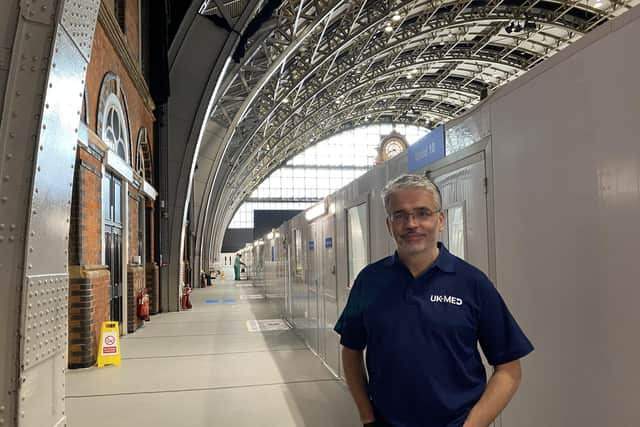Ukraine-Russia: Scottish nurse volunteering in Ukraine tells of finding tank wreckage at hospital
Montrose-born medic David Anderson said he arrived at the hospital in Trostianets, eastern Ukraine, to find the burnt out wreckage of the tank with its gun still pointing directly at the hospital building. Inside he was shown the devastation of the tank shelling, which has rendered the 170-bed hospital out of action.
There have been more than 130 attacks on healthcare facilities since Russian President Vladimir Putin launched his invasion. More than 100 fire stations and 250 fire engines have been destroyed in Ukraine.
Advertisement
Hide AdAdvertisement
Hide AdMr Anderson is a volunteer with frontline aid charity UK-Med, which has just received £600,000 from the UK Government to provide humanitarian support to the war-hit country.


He said: “I find it unbelievable and depressing that a hospital would be deliberately attacked. The tank is being guarded as evidence of a war crime and I could not believe what I was seeing. It had been blown up in the end and its gun turret is still pointing at the hospital it was attacking.
“I was shown round the wards and there was just devastation everywhere where the tank shells had hit.”
UK-Med will receive funding – worth up to £300,000 – from the Foreign, Commonwealth and Development Office to help train Ukrainian doctors, nurses and paramedics on how to deal with mass casualties. It has also set up mobile health clinics that are supporting the most vulnerable civilians remaining in Ukraine, including the elderly and young children.
The UK is donating a further £300,000 worth of medicines and pharmaceutical supplies to UK-Med – enough to support a hospital for up to six weeks.
Mr Anderson has worked on humanitarian missions in crisis countries including South Sudan and Myanmar and was in Beirut in the aftermath of the devastating 2020 explosion.
He said: “I’ve been in a couple of war zones before – but not on this scale. I don’t think you ever get used to going into conflict zones. I’m reasonably comfortable with seeing
limb injuries having worked in South Sudan and other places, but oh my God, the scale of this.
Advertisement
Hide AdAdvertisement
Hide Ad“We walked into one hospital, and they said there were 200 people, but it felt like more. There were people with traumatic amputations, flesh burns, blast injuries, just horrific injuries. It’s the volume that is genuinely astounding.”
He added: “People break down in tears and you are almost in tears with them actually. I think it’s probably the strongest feelings I’ve had going anywhere.
“Very possibly this depth of feeling is because I’ve never been involved in a crisis like this that is so close to home. You are used to humanitarian deployments to conflict zones in Africa, but I never, ever expected to be doing this work in Europe. That doesn’t mean the suffering of people in Tigray is any less, it’s just this situation is unfathomable.
He added: “The spectre of war in Europe has not been something we’ve really had to consider in our lifetime. People are going on stag or hen weekends to Bucharest or Warsaw or booking holidays to the Balkans or Turkey and just a couple of hundred miles away you have this terrible thing unfolding.”
Mr Anderson is also playing a crucial role helping to deliver UK aid on the ground.
He said: “There are lots of people cannot access healthcare because clinics and hospitals are being blown up by the Russians. They have a great health system here with extraordinarily skilled surgeons, but any health system would struggle with such extra demand.
“If you cannot get your regular medication, you become really unwell. Even the basic stuff we can provide like Metformin for diabetes or anticoagulants to prevent someone having a stroke, have a big impact.”
He added: “Longer term, Ukraine is going to need support offering rehab and psychological services to the vast numbers of people who have suffered life-changing injuries like bilateral amputations. I’ll stay as long as it takes.”
Advertisement
Hide AdAdvertisement
Hide AdHe said he is well aware of the risks he faces working in a country hit by conflict,
He said: “Have I personally felt scared? I’d be a fool to say that I haven’t, but I wouldn’t say that I’ve been asked to go anywhere or do anything I don’t want to do.
“There’s lots of sirens, there’s lots of people with guns and checkpoints to negotiate. My friends and family back home are obviously worried, and I can understand why it’s difficult when you see the news footage every day. We might be on the phone and then unfortunately an air raid siren will go off, and they then go ‘Oh, no’.
“People are clearly concerned about my being here, but they all understand that this is what I want to do and the reasons why it is important we help.”
Foreign Secretary Liz Truss said: “The Kremlin continues to lie about deliberate attacks on Ukraine’s hospitals and the indiscriminate targeting of civilians. Now our vital humanitarian support will help save lives and deliver medical expertise to the front line.”
Comments
Want to join the conversation? Please or to comment on this article.
